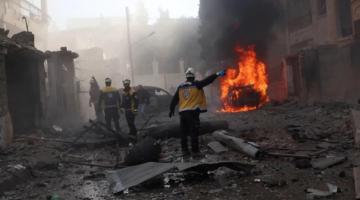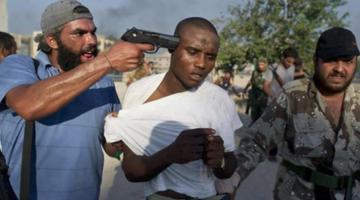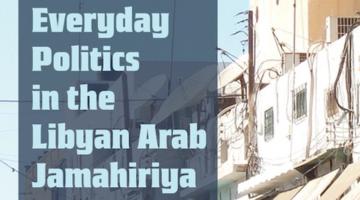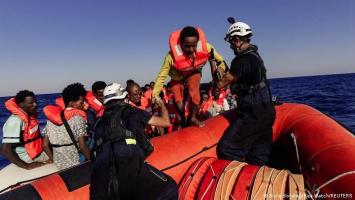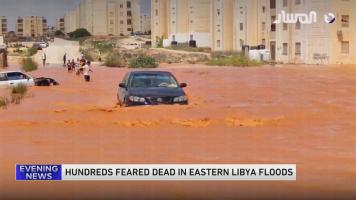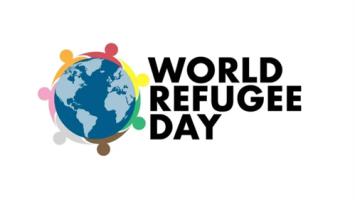Libya Is Home to a 21st-Century Slave Market But the UN Security Council Won’t Act
“Libya has become a marketplace for the trafficking of human beings.”
CNN recently aired a powerful report from Libya, where the reporters went into a house and shot footage of an auction of human beings. Yes, this is a 21st-century slave market. The journalists – Nima Elbagir, Raja Razek, Alex Platt and Bryony Jones – brought to the world’s attention something grotesque: evidence of how terrible the situation is these days not only in Libya, but also in the Sahel region of Africa. Their story evoked a strong message from the Manchester United midfielder, Paul Pogba, who wrote on Twitter, “my prayers go to those suffering slavery in #Libya. May Allah be by your side and may this cruelty come to an end!”
So far, there has been no such reaction from David Cameron (former Prime Minister of the UK), Nikolas Sarkozy (former President of France) and Barack Obama (former President of the United States). The three of them – as leaders of NATO – engineered the destruction of Libya in 2011. What we see now is the detritus of NATO’s policy.
In the last years of Obama’s presidency, he often referred to the “mistakes in Libya” – in 2015, he bemoaned the “leadership vacuum” created after the overthrow of the Qaddafi regime and in 2016, he said that the aftermath of the NATO war was the “worst mistake” of his presidency. Obama told Chris Wallace last year that while he still thought the NATO war was the “right thing to do,” he felt that “failing to plan for the day after” was the catastrophe. Libya, Obama said, is a “mess.”
“Sarkozy, Cameron and Obama – with the Gulf Arab monarchs – were eager to get into this war.”
We could debate whether the NATO war was indeed the right thing to do. After all, the French bombardment of Libya, which began before the US bombardment, came just when a high-level team with authority from the African Union was ready to leave Addis Ababa (Ethiopia) for Tripoli (Libya) to hold a dialogue with Qaddafi and his leadership. This was circumvented. All possible ways to end the conflict were not exhausted. Sarkozy, Cameron and Obama – with the Gulf Arab monarchs – were eager to get into this war. Obama did not, at that time, say anything about planning for the day after. I interviewed many people in the US administration and in the NATO countries, none of whom suggested any hesitation on the part of the NATO countries about what would happen after Qaddafi was removed from power. It was the critics of the war who warned these NATO leaders about the future of Libya. Of course, they did not listen (as they did not listen to critics of the 2003 Iraq War).
Fortress Europe
The destruction of Libya opened the door to the mass migration of desperate people from along the belt of central Africa, from Guinea to Eritrea. Chaos in Libya allowed the smugglers of human beings to activate old networks and bring people to the Libyan shoreline. From there, these refugees were placed on boats for the perilous crossing of the Mediterranean Sea. Thousands of people have died in this crossing, just as more thousands were able to arrive in Europe and seek some form of shelter. It was this arrival of the refugees that mostly bothered Europe’s managers rather than either the devastation of economic life in the Global South or the destruction of Libya’s state. Europe hyperventilated about the “invasion” of these refugees onto its pristine shores.
Attempts by European governments and the European Union to block the migrants from making the crossing came hard and fast. From 2015, the European Union set up a ferocious attempt to stop the boats from leaving Libyan waters (as well as to turn back boats on the high seas). A July 2017 Amnesty International Report – A perfect storm: The failure of European policies in the Central Mediterranean – shows that the interdiction efforts by the European Union on the high seas has only increased the threats to the migrants. “The immediate cause for the rising death toll,” writes the Amnesty researchers, “is that the conditions in which refugees and migrants have been made to cross the sea have deteriorated.” This is a result of the “reckless European strategy” to stop the refugee and migrant journey. A Human Rights Watch report from August amplifies these findings.
“Chaos in Libya allowed the smugglers of human beings to activate old networks and bring people to the Libyan shoreline.”
Away from the plain light of day, the European Union and the European governments have attempted to shift their border southwards from the northern Mediterranean to the southern belt of the Sahara Desert. The 2015 European Agenda on Migration, the 2015 Valletta Agreement between the European Union and several African states and the EUCAP-SAHEL Niger Mission have sent European funds to the countries of the Sahel from Mali to Chad to block the refugees and migrants from their northward journey. The International Organization of Migration found that these European-funded measures have made “migration routes more dangerous in the short term as smugglers and migrants take longer roads to circumvent security checks.”
It is clear to both migrants and to UN officials that the increased security measures in the Sahel has not stopped the journey of people, but increased the financial and human costs of the journey. Unknown numbers of people are dying in the desert. “The desert is a larger cemetery than the Mediterranean,” has become a slogan among refugees. “Because the desert is so vast,” said Olivia Headon of the International Organisation of Migration, “it is hard to know how many people are actually dying en route.” Death is one part of the journey.
“The European Union and the European governments have attempted to shift their border southwards from the northern Mediterranean to the southern belt of the Sahara Desert.”
The other is bribery. Security forces, bolstered by hundreds of millions of euros from the European Union, have increased the bribes necessary to make the perilous journey across the Sahara. The Monday convoy of the “double cabin Hilux” (the 4×4 wagons) leaves Agadez (Niger) for Sabha (Libya), crossing Dirkou, Dao Timi, Madama and Séguédine – at each point EU-backed forces collect bribes from the migrants and refugees.
During Qaddafi’s tenure, the Tummo border post that divided Niger from Libya used to be heavily manned and hard to get through. It is now open. Guards are not always visible. It makes the run to Sabha, Libya’s gateway to the Sahara, easy and then it is a straight drive up to Tripoli. Even with Fortress Europe deploying its full weight on the Sahara and in the Mediterranean, in other words, refugees and migrants can get to Libya.
Tears of Salt
Vincent Cochetel of the UN Refugee Agency recently said in Niger that the destruction of the Libyan state has created “a machine that destroys humans.” It is because of NATO’s war that the Libyan gateway opened and the refugees poured in. It is because of that war that Europe is now building its moats further and further inside the African continent. It is because of that war that thousands of migrants and refugees are now trapped inside Libya – the “machine that destroys humans.”
European money has not stopped the migrants from leaving Niger for Libya. A few arrests here and there of smugglers have only made them take more dangerous routes and have only increased the bribes to the security forces. European and Libyan coast guard boats have indeed made the traffic across the Mediterranean. Those twenty thousand migrants and refugees who are stranded in Libya have either entered the shadow world of the underground Libyan economy, been held in what Pope Francis called “concentration camps,” or been truly unfortunate to be sold in slave auctions.
“It is because of NATO’s war that the Libyan gateway opened and the refugees poured in.”
An Italian doctor who works on the island of Lampedusa (Italy), Pietro Bartolo has written a book – Lacrime di sale (Tears of Salt) – in which he documents the condition of those migrants and refugees who do make it to European shores. They are not only “skin and bones,” but they show “signs of torture – gunshots, electric shocks, burns, lashing, skinning – brutal and unacceptable things.” This torture has not taken place in the slave auctions, but in the detention centers, the concentration camps, that are in the plain light of day.
Horror in reaction to the CNN report is one thing. Clarity is another. This May, the chief prosecutor of the International Criminal Court Fatou Bensouda came before the UN Security Council. She made a forthright report on the situation in Libya and mentioned the “credible accounts that Libya has become a marketplace for the trafficking of human beings.” Bensouda wanted to widen her ambit from the investigation of crimes by Qaddafi-era officials to crimes in the post-Qaddafi era. NATO countries that prosecuted the war in 2011 were unwilling to allow the investigation to widen.
“Guterres did not say anything about who created the conditions for these crimes.”
When UN Secretary General Antonio Guterres saw the CNN report he said, “Slavery has no place in our world and these actions are among the most egregious abuses of human rights and may amount to crimes against humanity.” But Guterres did not say anything about who created the conditions for these crimes to be so openly committed. He would have had to point his finger at Europe and to the United States. No such finger was raised.
Graffiti in Lampedusa reads – Proteggere le Persone, Non i Confini (“Protect People, Not Borders”). That sentiment has a much deeper critique of the world than the high moral rhetoric of the UN. It points its finger at a world economy that has impoverished people, at the refugee crisis engendered by poverty and war, at the NATO war that destroyed Libya and at the way in which Europe has decided to use military force rather than compassion against the victims of poverty and war. The voice of that graffiti is much clearer than the voice from the UN Security Council.
Vijay Prashad is professor of international studies at Trinity College in Hartford, Connecticut. He is the author of 18 books, including Arab Spring, Libyan Winter (AK Press, 2012), The Poorer Nations: A Possible History of the Global South (Verso, 2013) and The Death of a Nation and the Future of the Arab Revolution (University of California Press, 2016). His columns appear at AlterNet every Wednesday.
This article previously appeared in Alternet and The Dawn News.

